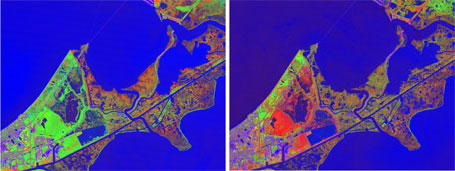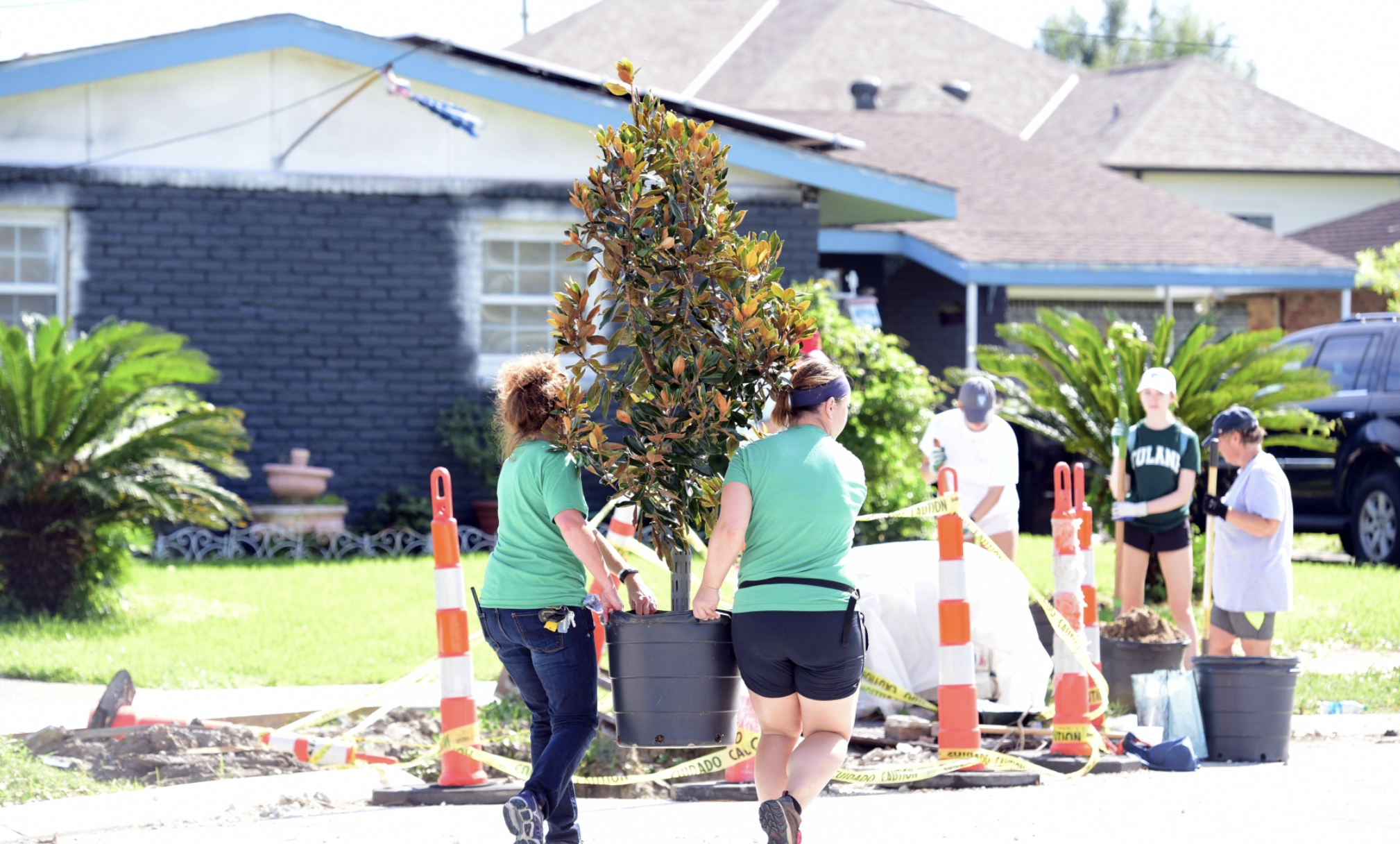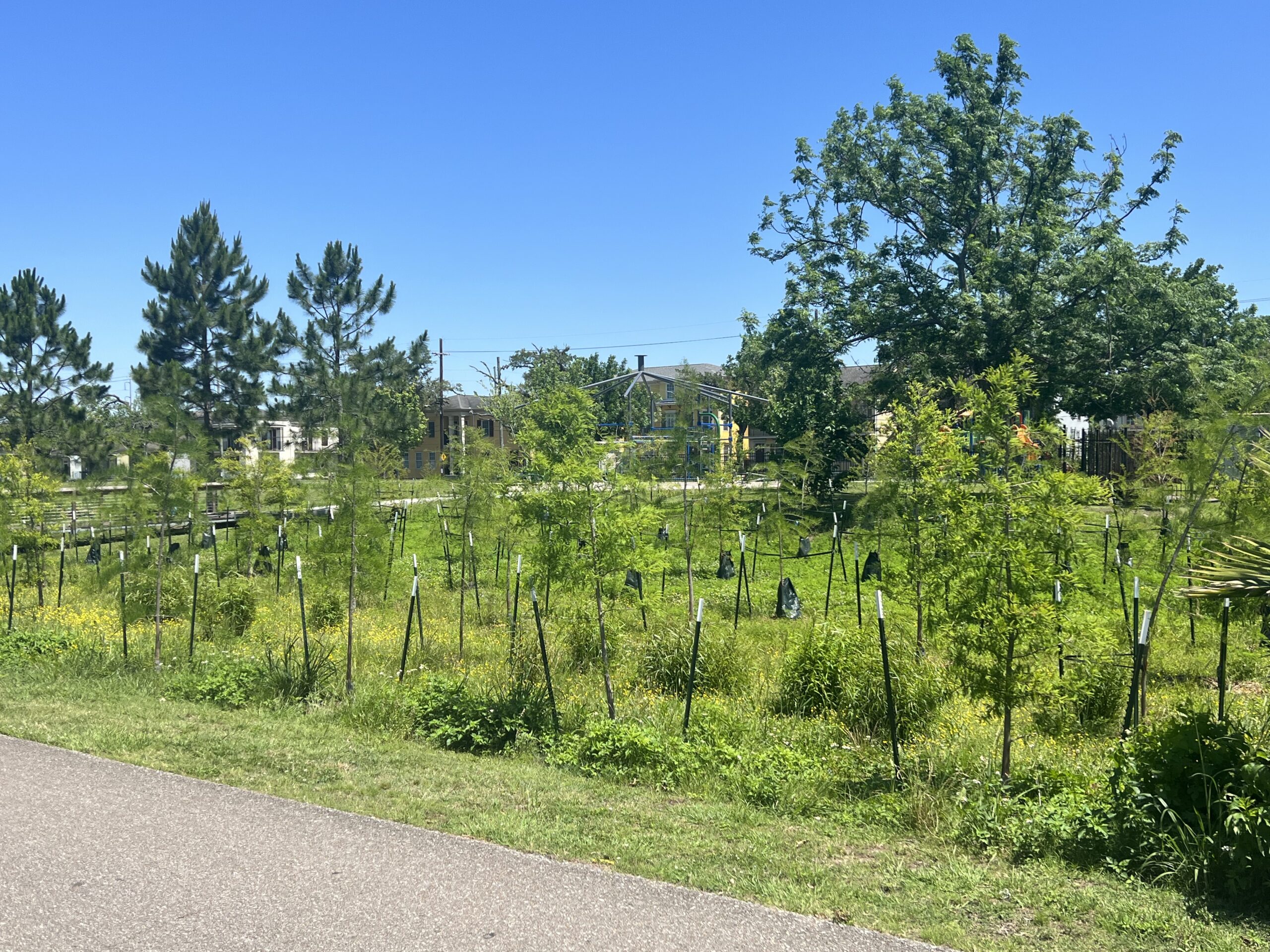By Carly Barovick, Charlie Morrill, and Brett Matthews
Hurricane Katrina’s wrath left an estimated 320 million trees in its wake. New Orleans alone lost about 10% of its overall urban tree canopy, which was already negligible in relation to other comparable cities in the United States. The effects of climate change along with the city’s low topography leave it in an increasingly vulnerable position. Further, the city is located in an area more susceptible to hurricanes and other natural disasters than most parts of the country.

Satellite imagery of the pre-Katrina (left) and post-Katrina (right) New Orleans tree landscape. Green indicates live trees and red indicates dead or damaged trees. Courtesy of USGS.
SOUL, or Sustaining Our Urban Landscape, is a non-profit dedicated to the reforestation of New Orleans. SOUL plants a variety of different trees that are native to the New Orleans landscape such as Live Oaks and Bald Cypress trees. Trees are known to aid as natural stormwater drainage infrastructure due to their ability to absorb large quantities of water, and in consequence, mitigate the socioeconomic ramifications of heavy rainfall and flooding.
In December of 2022 and in conjunction with the city’s government, SOUL completed their reforestation plan to provide a comprehensive look into what needed to be done to address the city’s unique environmental concerns. The organization gathered extensive satellite imagery and research data which was analyzed to accurately measure New Orleans’ tree canopy and assess which areas needed the most help. SOUL got in touch with the local community as well, hosting public meetings in order to develop a strategy.
Rachel Conway, the data and volunteer coordinator at SOUL, sat down with us to discuss her role within the organization and the non-profit’s impact on the local community. Conway revealed that she first got involved with SOUL during her time as an undergraduate student at Tulane University. After going to her first planting, she was hooked.

SOUL volunteers planting trees. Courtesy of SOUL New Orleans.
“A fully grown bald Cypress drinks 880 gallons of water a day…That’s just one. And then when you think about the system of trees that we’re planting in these neighborhoods, that’s not just one tree drinking water — they’re all drinking the water,” Conway says. However, SOUL’s mission extends beyond merely planting trees. Conway explains that New Orleans’ tree canopy is “shockingly low” at around 12%. “You think about Tulane, Audubon Park, St. Charles, and you’re like, how is that possible? We have these centuries-old live oaks covering the city, but it’s really in those concentrated wealthier areas,” Conway adds. In the Lower Ninth Ward, however, she says, “it’s a different makeup….we say at SOUL trees are barometers of health and wealth, and that is super true all over the world and the country, but really in New Orleans,”
Conway’s observations are spot on. According to a Woodwell Climate Report, the city is expected to face extreme heat in the coming years, with projections estimating that New Orleans will experience over double the amount of “heat danger days” by 2040-2060. This heat will disproportionately impact lower income families and people of color. Part of SOUL’s mission is to address these environmental concerns in an equitable manner that takes these intersecting factors into account.

SOUL’s recently planted trees on the Lafitte Greenway. Courtesy of Charlie Morrill.
Beyond their environmental functions, trees have also been shown to positively impact individuals’ mental and physical health. Serving as a natural air filter, Conway points out that trees reduce the likelihood of developing respiratory problems and afford communities with green spaces that encourage physical activity. Moreover, New Orleanians continue to maintain a special relationship with trees, with some even arguing that they are an essential piece of city dwellers’ sense of identity. After Hurricane Katrina, people used trees to find where the remains of their homes were located in what became an unrecognizable landscape. SOUL’s reforestation efforts are not only mending the effects of past natural disasters and diminishing the impacts of storms to come but also rebuilding the city’s relationship with the natural environment surrounding it.
You can find a video of our interview with Rachel Conway, data and volunteer coordinator at SOUL, here.
This piece was edited by Eliza Griggs as part of Professor Kelley Crawford’s Digital Civic Engagement course at Tulane University.
 NOLAbeings Multimedia artist Claire Bangser created NOLAbeings as a portrait-based story project that marries...
NOLAbeings Multimedia artist Claire Bangser created NOLAbeings as a portrait-based story project that marries...  Voodoo in New Orleans: Reviving history: New Orleans fortune telling This article takes a deep dive into the history of Voodoo in New Orleans, its hybridization with Catholicism, and its present-day place in the city's culture. The author visits fortune-tellers in the French Quarter, using their guidance as a tool for introspection rather than a deterministic predictor of the future. Through her experiences in New Orleans, the author feels a mystical connection to both the past and the future.
Voodoo in New Orleans: Reviving history: New Orleans fortune telling This article takes a deep dive into the history of Voodoo in New Orleans, its hybridization with Catholicism, and its present-day place in the city's culture. The author visits fortune-tellers in the French Quarter, using their guidance as a tool for introspection rather than a deterministic predictor of the future. Through her experiences in New Orleans, the author feels a mystical connection to both the past and the future. 